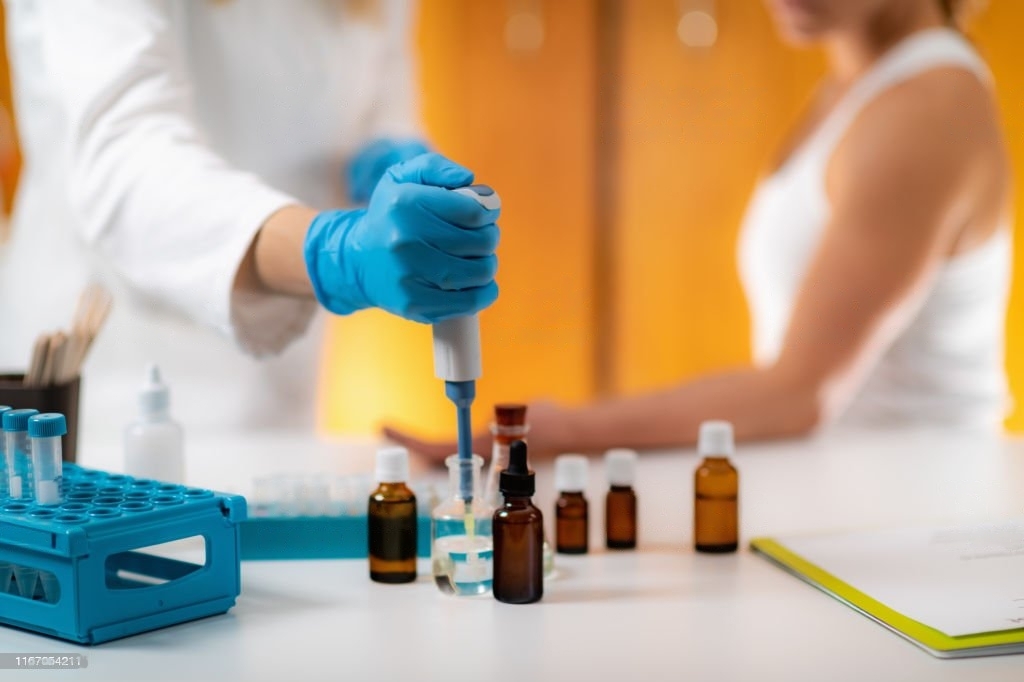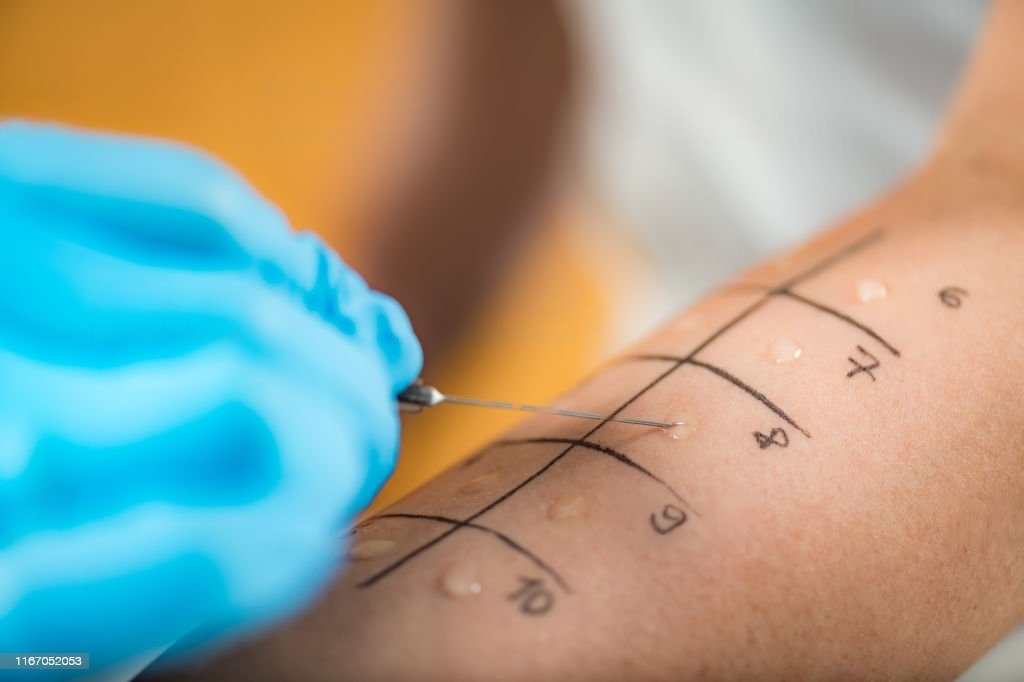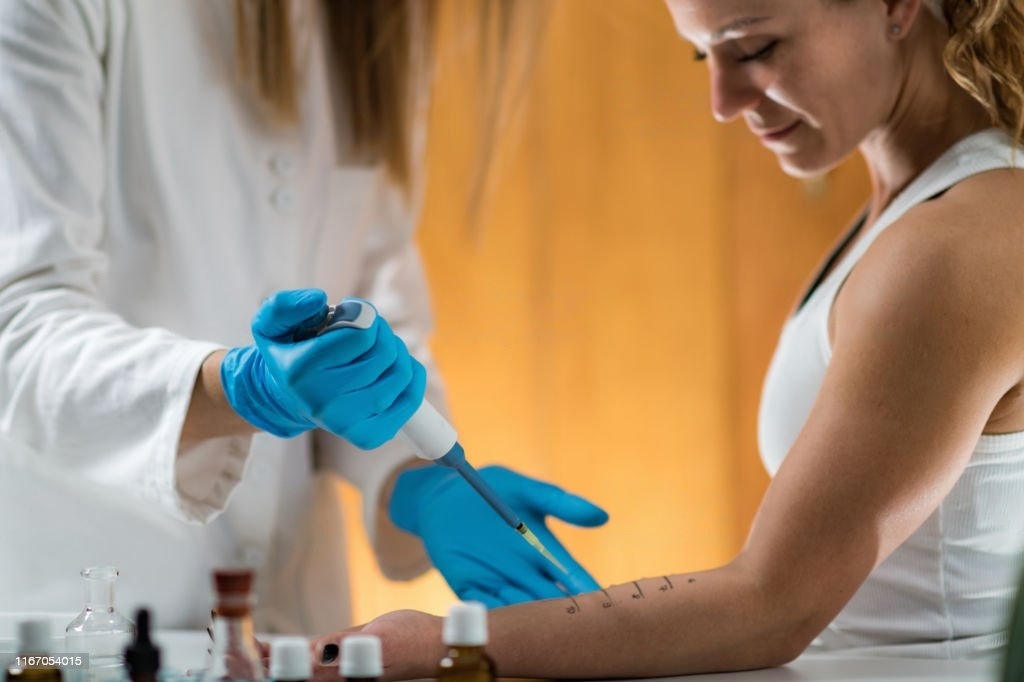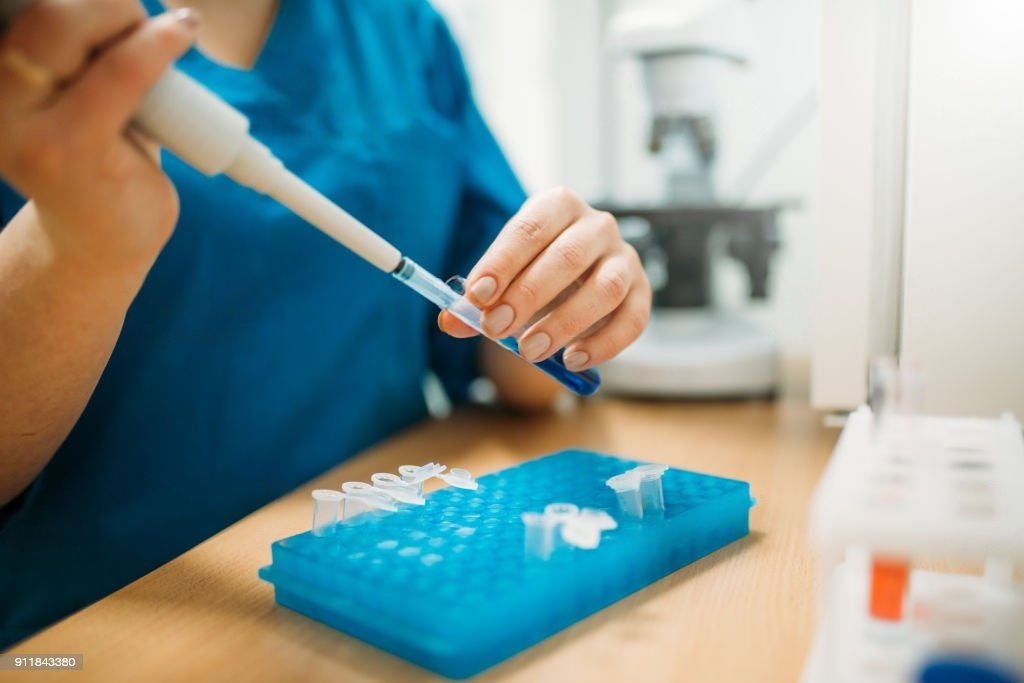Allergy tests are becoming increasingly common as people are becoming more aware of the potential allergens in their environment. These tests can help identify what substances a person is allergic to, allowing them to avoid those triggers and manage their symptoms more effectively. Many people wonder how much an allergy test costs, as it is not always covered by insurance.
The cost of an allergy test can vary depending on the type of test and the location where it is performed. A skin prick test, which is the most common type of allergy test, typically costs between $60 and $300. Blood tests, which are less invasive but also less accurate, can cost between $200 and $1,000. It is important to check with your insurance provider to see if they cover the cost of allergy testing, as some plans may only cover certain types of tests or require a referral from a doctor. To know exactly how much an allergy test is with your doctor, it will be best to ask them in advance. Alternatively, specialized centers such as https://www.nyallergy.com offer a convenient solution. Such centers provide allergy testing, diagnosis, and treatment all in one visit, helping to streamline the process for those suffering.
Understanding Allergy TestsAllergy tests are medical procedures that are used to determine the specific allergens that trigger an allergic reaction in a patient. These tests are typically performed by an allergist or immunologist, and they are used to diagnose allergies and to develop a treatment plan for the patient.
There are several different types of allergy tests, including skin tests, blood tests, and patch tests. Skin tests are the most common type of allergy test, and they involve exposing the patient’s skin to small amounts of allergens and monitoring the patient’s reaction. Blood tests are another type of allergy test that measures the levels of immunoglobulin E (IgE) antibodies in the patient’s blood. Patch tests are used to diagnose contact dermatitis, which is a type of skin allergy that is caused by contact with certain substances.
Allergy tests are typically used to identify allergens that trigger allergic reactions, such as pollen, dust mites, mold, pet dander, and certain foods. Common symptoms of allergies include sneezing, itching, runny nose, watery eyes, and hives. In severe cases, allergies can cause anaphylaxis, which is a life-threatening allergic reaction that requires immediate medical attention.
Skin tests are the most common type of allergy test, and they are typically performed using a skin prick or scratch test. During a skin prick test, a small amount of an allergen is placed on the patient’s skin, and a small needle is used to prick the skin and introduce the allergen into the skin. If the patient is allergic to the allergen, a small red bump will appear on the skin within 15-20 minutes. A scratch test is similar to a skin prick test, but it involves scratching the skin with a small needle instead of pricking it.
Blood tests are another type of allergy test that measures the levels of IgE antibodies in the patient’s blood. IgE antibodies are produced by the immune system in response to an allergen, and they are responsible for triggering allergic reactions. A high level of IgE antibodies in the blood is a sign that the patient is allergic to a particular allergen.
Patch tests are used to diagnose contact dermatitis, which is a type of skin allergy that is caused by contact with certain substances. During a patch test, a small amount of an allergen is placed on the patient’s skin and covered with a patch. The patch is left on the skin for 48-72 hours, and the patient is monitored for any signs of an allergic reaction.
Overall, allergy tests are an important tool for diagnosing allergies and developing a treatment plan for patients. By identifying the specific allergens that trigger an allergic reaction, doctors can develop a personalized treatment plan that may include medications, immunotherapy, and lifestyle changes to help manage the patient’s symptoms and reduce their risk of anaphylaxis.
Types of Allergy Tests
Allergy tests are conducted to identify the substances that trigger an allergic reaction in a person. There are different types of allergy tests available, and the most appropriate test for an individual may depend on their medical history and the suspected allergen. How much is an allergy test will also depend on which test/s you end up needing.
Skin Tests
Skin tests are the most common type of allergy test. They involve pricking or scratching the skin with a small amount of a suspected allergen and observing the reaction. There are three types of skin tests:
- Skin prick test: This test involves pricking the skin with a small amount of an allergen and observing the reaction after 15-20 minutes.
- Intradermal skin test: This test involves injecting a small amount of an allergen under the skin and observing the reaction after 15-20 minutes.
- Patch test: This test involves applying a small amount of an allergen to the skin and observing the reaction after 48-72 hours.
Blood Tests
Blood tests are another type of allergy test. They involve drawing blood and testing it for the presence of specific antibodies that indicate an allergic reaction. The most common blood test for allergies is the RAST (radioallergosorbent) test.
At-Home Allergy Tests
At-home allergy tests are becoming increasingly popular. These tests involve collecting a sample of blood or saliva and sending it to a laboratory for analysis. However, it is important to note that at-home allergy tests may not be as accurate as tests conducted in a medical setting.
In conclusion, there are several types of allergy tests available, and the most appropriate test for an individual may depend on their medical history and the suspected allergen. It is important to consult with a healthcare professional to determine the most appropriate test and to interpret the results accurately.
Common Allergens Tested
Allergy tests help identify the specific allergens a person is allergic to. The most common allergens tested include:
- Pollen: Pollen is a common allergen that causes hay fever or seasonal allergies. Trees, grasses, and weeds are the primary sources of pollen.
- Mold: Mold spores are another common allergen. Indoor and outdoor mold can cause allergic reactions, especially during humid weather.
- Foods: Food allergies are common and can cause severe reactions. Common food allergens include milk, eggs, peanuts, shellfish, soy, and wheat.
- Pet Dander: Pet dander is a common allergen that can cause allergic reactions in people. Animal hair, skin, and saliva contain allergens that can cause allergies.
- Dust: Dust allergies are common, and symptoms can range from mild to severe. Dust mites are the primary source of dust allergens.
- Insects: Insect stings or bites can cause allergic reactions in some people. Bees, wasps, hornets, and fire ants are common sources of insect allergens.
- Latex: Latex allergies are becoming more common. Latex is found in many products, including gloves, balloons, and rubber bands.
- Drug Allergies: Some people may be allergic to certain medications. Common drug allergens include antibiotics, aspirin, and ibuprofen.
Allergy tests can also help identify other less common allergens, including shellfish, fish, and soy. It’s essential to get an allergy test if you suspect you have allergies, so you can avoid allergens and manage your symptoms effectively.
Symptoms Indicating the Need for an Allergy Test
When a person experiences symptoms that are not easily explained, an allergy test may be necessary to determine the cause. Allergy symptoms can range from mild to severe and can affect different parts of the body. Some of the most common symptoms that may indicate the need for an allergy test include:
- Watery eyes and runny nose: These symptoms are often associated with seasonal allergies, but they can also be caused by other allergens such as pet dander, dust mites, or mold.
- Hives, rash, redness, and swelling: These symptoms are often the result of an allergic reaction to food, medication, or insect bites/stings. They can be mild or severe and may require immediate medical attention.
- Coughing and sneezing: These symptoms are often associated with allergies to pollen, dust, and mold. They can also be caused by other irritants such as smoke or air pollution.
- Wheezing: Wheezing is a common symptom of asthma, which can be triggered by allergens such as dust mites, pet dander, and pollen.
- Fever, diarrhea, and stomach pain: These symptoms are often associated with food allergies and can be caused by consuming certain types of food.
If a person experiences any of these symptoms on a regular basis, it may be necessary to undergo an allergy test to determine the cause. An allergy test can help identify the specific allergen that is causing the symptoms, which can then be avoided or treated accordingly.
Allergy Tests and Asthma
Allergy tests are a common diagnostic tool used to identify the substances that trigger allergic reactions in individuals. These tests can be particularly beneficial for patients with asthma, as allergies are a common trigger for asthma symptoms such as coughing and wheezing.
There are several types of allergy tests available, including skin tests, blood tests, and patch tests. Skin tests involve exposing the skin to small amounts of allergens and observing the reaction, while blood tests measure the level of allergen-specific antibodies in the blood. Patch tests are used to identify contact allergens that may be causing skin reactions.
For patients with asthma, allergy testing can help identify the allergens that trigger their symptoms. Once these allergens are identified, patients can take steps to avoid exposure to them and reduce their risk of experiencing asthma attacks. In some cases, allergy immunotherapy may also be recommended to help desensitize the patient to the allergens over time.
It is important to note that allergy tests are not without limitations. False positives and false negatives can occur, and some patients may not respond well to certain types of tests. Additionally, allergy testing should always be performed by a qualified healthcare provider with experience in allergy diagnosis and treatment.
In conclusion, allergy testing can be a valuable tool for patients with asthma and other allergic reactions. By identifying the allergens that trigger their symptoms, patients can take steps to avoid exposure and reduce their risk of experiencing asthma attacks. However, it is important to understand the limitations of allergy testing and to work with a qualified healthcare provider to ensure accurate diagnosis and effective treatment.
Interpreting Allergy Test Results
After undergoing an allergy test, the patient will receive a report that details their allergy test results. This report will be interpreted by the allergist, who will use the results to diagnose the patient’s allergies and develop a treatment plan.
The allergy test report will typically list the allergens that were tested for and the patient’s reaction to each allergen. The reaction is typically measured on a scale of 0 to 4, with 0 indicating no reaction and 4 indicating a severe allergic reaction.
The allergist will use this information to determine which allergens the patient is allergic to and the severity of their allergic reaction. If the patient has a severe allergy to a particular allergen, the allergist may recommend that they avoid that allergen altogether.
In addition to the reaction scale, the report may also include other information such as the patient’s antibody levels and histamine levels. Antibodies are produced by the immune system in response to an allergen, while histamine is a chemical released by the body during an allergic reaction.
The report may also include images of the patient’s skin, showing any redness or wheals that developed during the test. This can be helpful in identifying which allergens the patient is most sensitive to.
Overall, interpreting allergy test results requires a knowledgeable allergist who can accurately diagnose the patient’s allergies and develop an appropriate treatment plan. By understanding the patient’s allergy test results, the allergist can help the patient avoid severe allergic reactions and manage their allergies effectively.
Treatment After Allergy Testing
After an individual has undergone allergy testing, the allergist will review the results and develop a treatment plan tailored to the individual’s specific allergies. The treatment plan may include medication, immunotherapy, or both.
Medications such as antihistamines may be prescribed to relieve symptoms such as itching, sneezing, and runny nose. Over-the-counter medications may also be recommended. In some cases, the allergist may prescribe epinephrine for severe allergic reactions.
Immunotherapy, also known as allergy shots, is a treatment option that involves gradually introducing small amounts of the allergen to the individual’s immune system. Over time, the immune system becomes less sensitive to the allergen, reducing the severity of symptoms. Immunotherapy is typically recommended for individuals with severe allergies or those who do not respond well to medication.
It is important to follow the treatment plan prescribed by the allergist and to continue taking any prescribed medications as directed. It may take time to see improvement, but with proper treatment, individuals can manage their allergies and improve their quality of life.
Food Allergies and Testing
Food allergies are a common cause of allergy symptoms, ranging from mild to severe reactions. The most common food allergens include milk, eggs, peanuts, tree nuts, fish, shellfish, soy, and wheat. Allergic reactions to food can cause anaphylaxis, a severe and potentially life-threatening reaction.
Food allergy testing can help identify the specific foods that trigger an allergic reaction. There are several methods of testing for food allergies, including skin prick tests, blood tests, and oral food challenges.
Skin prick tests involve placing a small amount of the suspected allergen on the skin and then pricking the skin to allow the allergen to enter the body. A positive reaction will result in redness and swelling at the site of the prick.
Blood tests measure the levels of specific antibodies in the blood that are associated with an allergic reaction. These tests can be useful in identifying food allergies, but they are not always reliable.
Oral food challenges involve consuming small amounts of the suspected allergen under medical supervision to see if a reaction occurs. This is the most accurate method of testing for food allergies, but it can be risky for people with severe allergies.
The cost of food allergy testing can vary depending on the type of test and the location. Skin prick tests and blood tests can cost around $100 to $200 per test, while oral food challenges can cost several hundred dollars. It is important to check with your insurance provider to see if they cover the cost of food allergy testing.
Overall, food allergy testing can be a useful tool in identifying the specific foods that trigger an allergic reaction. However, it is important to work with a healthcare provider to determine the best method of testing and to ensure proper diagnosis and management of food allergies.
Insurance and Allergy Test Cost
When it comes to the cost of allergy testing, insurance coverage can play a significant role. The cost of an allergy test can vary depending on the type of test, the location, and the healthcare provider. However, insurance can help reduce the out-of-pocket cost of an allergy test.
Many health insurance plans cover the cost of allergy testing, but the amount of coverage can vary. Some insurance plans may require a copay or deductible, while others may cover the entire cost of the test. It is important to check with your insurance provider to determine the extent of your coverage.
For those without insurance coverage, the cost of allergy testing can range from $200 to $1,000 or more. However, many healthcare providers offer discounts or payment plans to help make the cost more manageable. It is always a good idea to ask about any available discounts or payment options.
It is also important to note that the cost of an allergy test may not be the only expense. If the test results indicate that the patient has allergies, additional costs may be incurred for treatment, such as allergy shots or medication.
In summary, the cost of an allergy test can vary depending on several factors, including insurance coverage, the type of test, and the healthcare provider. It is important to check with your insurance provider to determine the extent of your coverage and to ask about any available discounts or payment plans.
Choosing a Healthcare Provider for Allergy Testing
When it comes to allergy testing, choosing the right healthcare provider is crucial to ensure accurate diagnosis and effective treatment. Here are some factors to consider when selecting a healthcare provider for allergy testing:
Credentials
It is important to choose a healthcare provider with the appropriate credentials and training to perform allergy testing. Board-certified allergists have completed specialized training in allergy and immunology and are experts in the field. However, other healthcare providers such as physicians and nurse practitioners may also be qualified to perform allergy testing.
Experience
Experience is another important factor to consider when choosing a healthcare provider for allergy testing. Providers who have been practicing for a longer period of time may have more experience with a wider range of allergies and testing methods.
Testing Methods
Different healthcare providers may use different methods to test for allergies. Some providers may only offer skin prick testing, while others may also offer blood tests or patch testing. It is important to choose a provider who offers the testing method that is best suited for your individual needs.
Insurance Coverage
Allergy testing can be expensive, so it is important to choose a healthcare provider who accepts your insurance. Be sure to check with your insurance provider to see which healthcare providers are in-network and covered under your plan.
Communication
Effective communication between the healthcare provider and patient is essential for accurate diagnosis and treatment. Choose a provider who takes the time to listen to your concerns and answer your questions in a clear and understandable manner.
Overall, choosing a healthcare provider for allergy testing requires careful consideration of credentials, experience, testing methods, insurance coverage, and communication. By taking the time to choose the right provider, patients can ensure accurate diagnosis and effective treatment of their allergies.
Living with Allergies
Living with allergies can be challenging and affect one’s quality of life. Allergies can impact a person’s lifestyle by limiting the foods they can eat, the activities they can participate in, and the places they can go. Environmental allergens, such as pollen, dust mites, and animal dander, can cause hay fever symptoms, including sneezing, runny nose, and itchy eyes. Additionally, contact dermatitis can occur when a person comes into contact with an allergen, resulting in an itchy, red rash.
To manage allergies, it is important to identify the specific allergen causing the reaction. This can be done through allergy testing, which can be costly depending on the type of test and the location. Some common allergy tests include skin prick tests, blood tests, and patch tests. The cost of these tests can range from a few hundred to over a thousand dollars.
Once an allergen is identified, individuals can take steps to avoid exposure. This may involve making changes to their environment, such as using air filters and avoiding certain foods. In some cases, medications such as antihistamines and corticosteroids may be prescribed to manage symptoms.
Living with allergies can be frustrating, but with proper management, individuals can still lead a fulfilling life. It is important to work with a healthcare professional to develop a plan for managing allergies and to stay informed about new treatments and strategies for avoiding allergens.
Frequently Asked Questions
What is the cost of an allergy test without insurance?
The cost of an allergy test without insurance can vary depending on the type of test and the location where it is performed. On average, a skin allergy test can cost between $60 and $300, while a blood test can cost between $200 and $1,000.
How much does an allergy test cost with insurance?
The cost of an allergy test with insurance depends on your insurance plan. Most insurance plans cover the cost of allergy testing, but you should check with your insurance provider to confirm your coverage and any associated costs.
Where can I find allergy test cost near me?
You can find allergy test cost near you by contacting your local healthcare provider or allergist. You can also search online for local clinics or labs that offer allergy testing services.
What is the cost of an allergy test for a dog?
The cost of an allergy test for a dog can vary depending on the type of test and the location where it is performed. On average, a skin allergy test for a dog can cost between $200 and $300, while a blood test can cost between $300 and $500.
How much does a food allergy test cost without insurance?
The cost of a food allergy test without insurance can vary depending on the type of test and the location where it is performed. On average, a skin allergy test for food allergies can cost between $60 and $300, while a blood test can cost between $200 and $1,000.
What is the cost of a skin allergy test?
The cost of a skin allergy test can vary depending on the type of test and the location where it is performed. On average, a skin allergy test can cost between $60 and $300.
How much is an allergy test for dogs?
The cost of an allergy test for dogs can vary depending on the type of test and the location where it is performed. On average, a skin allergy test for a dog can cost between $200 and $300, while a blood test can cost between $300 and $500.








